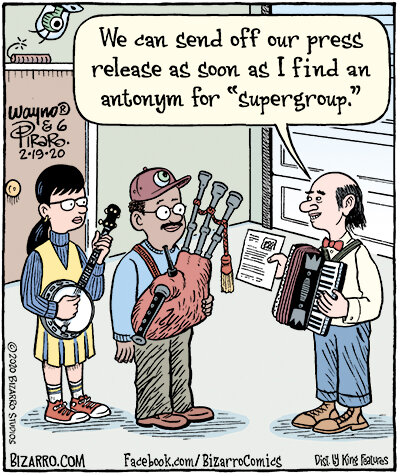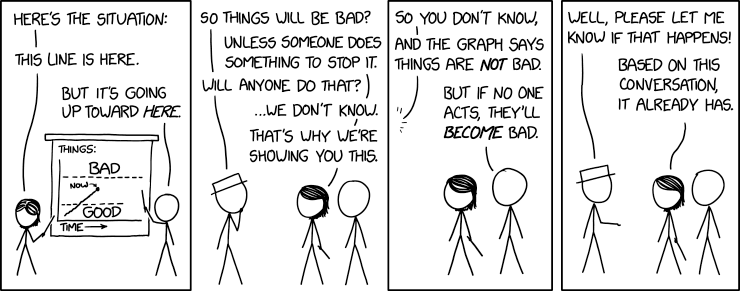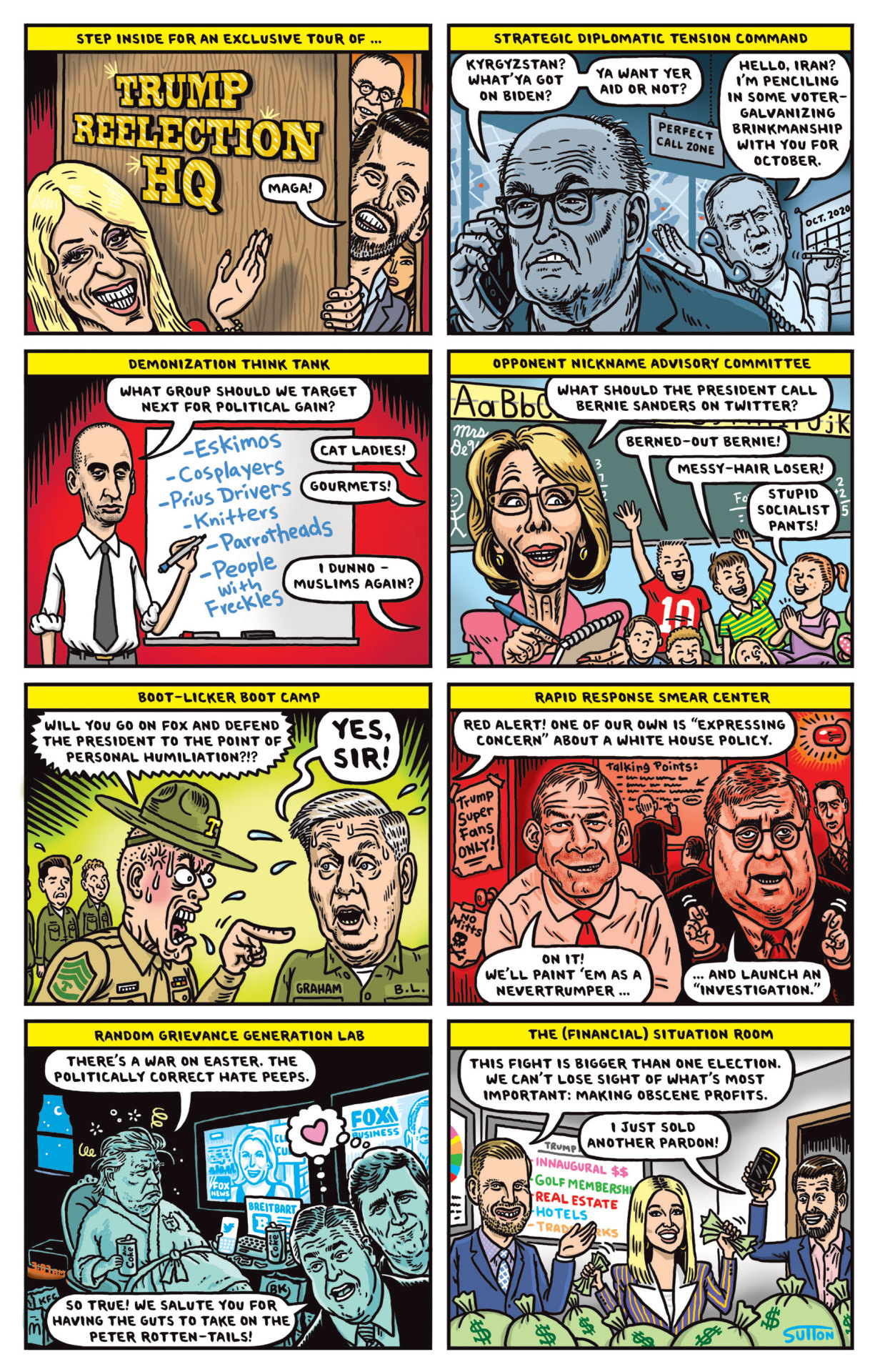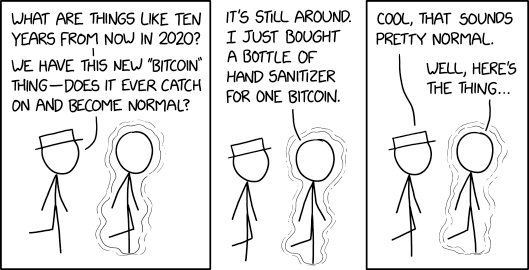Sunday, 5 April 2020 - 4:05pm
This week, I have been mostly reading:
- Doonesbury — by Garry Trudeau:
- Coronavirus may precipitate a crash but it won’t be its cause, which will be the overstressed state of the world economy — Richard Murphy:
Coronavirus would not be the issue it is in economic terms if we did not have such an interconnected world, where supply lines are stretched to their limits so that many companies are at risk from the slightest disruption to their systems, which coronavirus is already creating, and which could get much worse. And nor would coronavirus be such a threat if households in many parts of the world were not already over-stretched with debt, meaning any disruption will tip many over financial limits and into serious financial risk of bankruptcy.
- Animal on the Street - Flat-Earther dies trying to prove the Earth is flat. — Phil Are Go!:

More… - Joe Biden Would Be Donald Trump's Dream Opponent — Conor Lynch in Truthdig:
Biden is a lot like Clinton, but worse in almost every measurable way. On issue after issue, Biden has consistently been to the right of Clinton throughout his fifty-year political career. He has a record of advocating cuts to Social Security and Medicare; he helped write the 1994 Crime Bill that led to an explosion in mass incarceration; he played a critical role in passing the 2005 bankruptcy bill that stripped bankruptcy protection from some of the most vulnerable people. Biden also supported and championed the Iraq War. This list goes on and on. Beyond his extremely problematic record, which will make it hard for Democrats to go after Trump about, say, cutting Social Security (which Biden himself supported not too long ago), Biden has his own personal scandals that will make it very difficult for him to cast Trump as corrupt.
- Bizarro — by Wayno and Piraro:

- The infinite scroll — David Roth at the Columbia Journalism Review:
Even on the websites of august institutions ads interrupt the text every two paragraphs; ads follow you down the sides of the page like store security; ads pop up in boxes that resist being closed, the elusive little x evading your cursor. There have always been websites like this, usually the kind that we save for private browsing: places to stream out-of-market sporting events, or download bittorrents of hard-to-find films, or browse other things that no reasonable person would admit to. Now, a great many websites are at least a little bit like this. Not all of these sites are as hard up as they appear, but all of them—the authentically desperate and the merely thirsty, the ones trying heroically to sell their way out of a downward spiral and those blithely steering into it—have made the same choice. Which is to look and feel and be more friendly to advertisers than readers.
- Sshh! He's TRYING to SLEEP! — Phil Are Go!:

- Ted Chiang Explains the Disaster Novel We All Suddenly Live In — interviewed by Halimah Marcus in Electric Literature:
While there has been plenty of fiction written about pandemics, I think the biggest difference between those scenarios and our reality is how poorly our government has handled it. If your goal is to dramatize the threat posed by an unknown virus, there’s no advantage in depicting the officials responding as incompetent, because that minimizes the threat; it leads the reader to conclude that the virus wouldn’t be dangerous if competent people were on the job. A pandemic story like that would be similar to what’s known as an “idiot plot,” a plot that would be resolved very quickly if your protagonist weren’t an idiot. What we’re living through is only partly a disaster novel; it’s also—and perhaps mostly—a grotesque political satire.
- Life in the stupidverse, part elventy-million — This Modern World by Tom Tomorrow:

- Solar Panels Could Be the Best Fad Ever — Clive Thompson in Wired:
In a 2014 study, Yale economist Kenneth Gillingham and a colleague looked at the adoption of residential solar installations in Connecticut and found that it spread through neighborhoods in a “wave-like centrifugal pattern.” A subsequent study, by economist Stefano Carattini, then at Yale, and two colleagues, documented the same phenomenon in Switzerland. And when I dropped by the offices of Brooklyn Solarworks, the folks there showed me a map of where they'd installed panels. Sure enough, it was all epidemiological hot spots—you see empty streets with no solar at all, then blocks that are simply crammed with it, neighbors next to neighbors with arrays. […] Even language matters. In Switzerland, there are regions that speak Italian, German, French. If solar is spreading, it stops when it hits a language border. Solar virality is a matter of, quite literally, word of mouth. This points to an obvious corollary: If we want to encourage climate-saving behaviors, people need to talk more.
- Scientific Briefing — xkcd by Randall Monroe:

- Joe Biden Obviously Has Dementia and Should Withdraw — Ted Rall:
I spent the last few years watching my mother’s decline due to dementia caused by Alzheimer’s. She had been brilliant. Years before her death, however, she was having a tough time keeping it together. I would have voted for her as president in 2012 but not 2016. It would have been wrong. No one who has been close to someone deteriorating from that disease could fail to see the same signs in Joe Biden. In online discussions Biden apologists sometimes say that a senile Biden is better than an evil Trump. Is this really where we are? Consider the 20 or so contenders for the Democratic nomination as of late last year. All of them except for one—Biden—were mentally competent. Marianne Williamson came off as loopy and Tom Steyer was painfully awkward but both were in full command of their faculties. Congratulations, Democrats, you literally picked the worst of the bunch.
- Sutton Impact — by Ward Sutton:

- When it comes to sick leave, we’re not much better prepared for coronavirus than the US — Peter Whiteford and Bruce Bradbury in the Conversation:
In Hobart on Sunday health authorities said a man infected with coronavirus ignored instructions to self-isolate while he waited for his test results because he didn’t want to miss his casual shifts at Hobart’s Grand Chancellor Hotel. The Bureau of Statistics Characteristics of Employment Survey shows that in 2019, 24.4% of Australian employees were casuals without any access to paid leave. Adding in the self-employed, the proportion of all Australian workers without paid sick leave would be 37%. As the chart shows, Australians without paid sick leave are over-represented in some of the sectors with the greatest degree of personal contact with members of the public. 63% of people working in the accommodation and food services sector have no paid sick leave, and 45% of sales workers and 42% of community and personal service workers.
- 2010 and 2020 — xkcd by Randall Monroe:

- What the Coronavirus Emergency Has to Do with Biden vs. Sanders — Norman Solomon:
“It is time to ask how we got to where we are, not only our lack of preparation for the virus, but how we end up with an economy where so many people are hurting at a time of massive income and wealth inequality,” Sanders said at the close of his recent debate with Biden. “It is time to ask the question of where the power is in America. Who owns the media? Who owns the economy? Who owns the legislative process? Why do we give tax breaks to billionaires and not raise the minimum wage?” While so-called “moderate” Democrats like Biden don’t want to answer -- or even hear -- such questions, Sanders insists on continuing to ask them. Such perseverance has never been more needed than at this pivotal moment, with so many lives in the balance. “Where the power is in America” has everything to do with why the U.S. government’s response to the unfolding coronavirus catastrophe has continued to be so anemic, foreshadowing so many more deaths and so much more grief.
